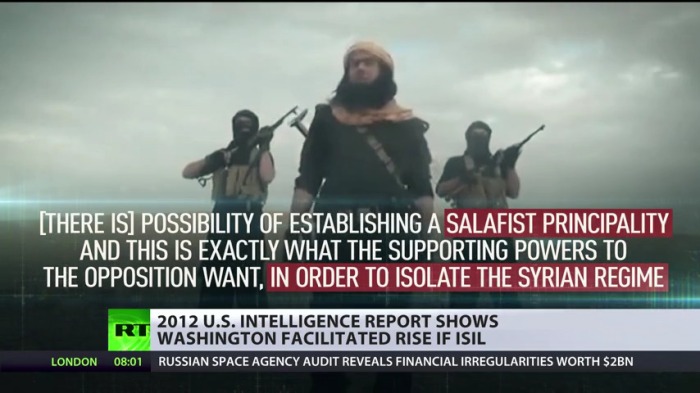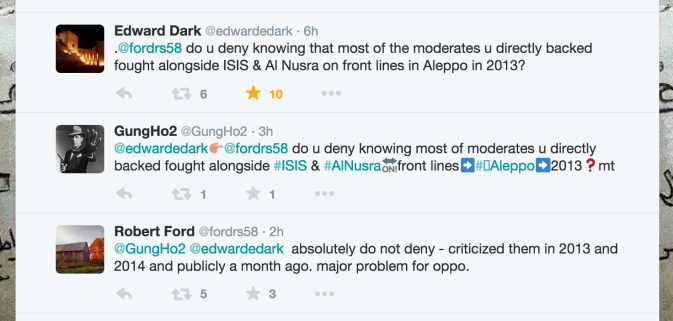AS OF THIS WRITING our reporting on the newly declassified August 2012 DIA document has yet to make it into mainstream media in the West; it has however, made it into RT News. On Saturday, RT’s International English broadcast, based in London and Washington D.C., relied on Levant Report’s original reporting of both the DIA document and former Ambassador to Syria Robert Ford’s prior relationship to ISIS aligned militants.
Monday (5/25) and Tuesday will be significant days to see whether the story gathers enough momentum in the press to elicit an official response from Washington. For this to happen the DIA document would have to be covered in British media, or by an American newsroom with enough clout to attract attention, like McClatchy’s Washington Bureau or The Intercept, in order to get the ball rolling.
The well-known investigative journalist and best-selling author Nafeez Ahmed, whose counter-terrorism work gained official recognition by the 9/11 Commission, published an excellent in-depth investigative piece on the DIA report at INSURGE intelligence.
Nafeez was recently a columnist for The Guardian, one of Britain’s big three national newspapers, and is still based in the UK. He took to Twitter over the weekend and announced that he is currently attempting to push the story into mainstream media, as the DIA document contains startling revelations that deserve the world’s attention and candid debate:
OF COURSE, MANY OF THESE establishment media outlets have been so heavily invested in advancing a particular set of false assumptions regarding the dynamics of the conflict in Syria, that they would be loath to publish anything that damages their own credibility, even should clear evidence in official government documents contradict the prior reporting.
We are living in an age in which the unique propaganda system that operates in the West is so effective that it often doesn’t matter if government officials admit that they were purposefully promoting a false narrative, or were engaged in criminal conspiracy.
So long as their admissions come long after the fact, and so long as they occupy positions of prestige and respect, they can expect not to come under close scrutiny by a media establishment that itself was complicit in uncritically parroting their falsehoods all along.
We at Levant Report have been trying to shine a spotlight on former Ambassador to Syria Robert Ford’s material support of Al-Qaeda for a long time. In February 2015, he openly confessed to having given support to ISIS and Al-Nusra terrorists after being questioned by Al-Monitor News journalist Edward Dark (a violation of Title 18 U.S. Code § 2339A – Providing material support to terrorists)—
THE TWITTER HANDLE, @fordrs58 is indeed Ambassador Robert Ford’s account, as was confirmed to me in a personal email by Dr. Joshua Landis, Director of Middle East Studies at the University of Oklahoma and the most well-known Syria scholar in the United States.
Ford’s admission came after a lengthy Twitter conversation in response to an original Feb. 18, 2015 entry by Carnegie Endowment for International Peace scholar Aaron Lund. Though Ford might now claim “good intentions” or that he was merely following orders from the State Dept., this defense certainly didn’t work for the multiple FBI arrests and successful prosecutions of American citizens that arguably had even less involvement—and at lower levels—with rebels in the Syrian conflict.
While RT News broadcast the video evidence of Ford’s crimes, it remains for American media and US Congress to begin asking serious questions about the State Dept., DOD, and CIA’s relationship with confessed ISIS collaborators on the Syrian battlefield. At the very least, a serious Congressional investigation is warranted. Americans must demand this.


https://levantreport.com/2015/05/26/guest-analysis-by-robert-barsocchini-a-critical-examination-of-the-dia-document-on-dynamics-of-syrian-conflict/
http://www.philipbobbitt.com/skinner.
On the matter of the recently released DIA document discussing Syria and the possibility of the formation o a “Salafist principality”, these comments ring true:
‘It should be stressed that clearly admitting the West would “want” a Salafist principality in Eastern Syria is not generally the kind of statement people in governments would make of themselves, even in private, hence makes it less likely here that the West is being referred to specifically by that statement, as does the inclusion of the phrase “if the situation unravels” (meaning FSA control of the East) an Islamic state could result. However, it is noteworthy that the West and the Islamists are so easily conflated in this document (this conflation may well be intentional as a way of discussing benefits without clearly stating that they might be desired), as they are clearly delineated as both being opposed to the Assad government, and for similar reasons – opposing Iran and the Shia, backed by Russia and China, the latter part being of greater import to the West. The doc also makes very clear that the FSA was/is being supported by AQI and its Islamist affiliates, and that those Islamists were known to be “the major forces driving the insurgency”. It has long been known that FSA shares its US/Western/Gulf/Turkish supplies with and converts to Islamist groups, and AQI, the ISIS precursor, has always been known as particularly aggressive. And as Dr. Ahmed points out, the document nowhere suggests ending aid to the opposition due to its being driven by AQI and affiliates, and only frames the potential creation of the “Islamic state” as a bad thing in relation to Iraq. In relation to Syria/Assad, it is not framed as a bad thing, but as something that would be seen to “isolate” Assad, a goal shared by the West and the Islamist groups. So, these documents may well be an example of discussing a strategy while attempting to maintain some degree of “plausible deniability”.’
I quite side with this assessment, it is called amphiboly and it strikes me as quite likely the reason it was not further censored.
P.S. The geopolitical strategist and scholar Philip Bobbit seems to frequently enact this discursive strategy, consisting of a systematic ambiguity concerning prescriptive vs. descriptive interpretations, one which has not gone unnoticed by certain academics, and which seems to be exemplified in the following paragraph:
‘The last word on Machiavelli’s purposes should belong to Niccolo Machiavelli himself. Skinner concludes his essay by asserting, “A further objection to Bobbitt’s reading is that Machiavelli never asserts in The Prince that the sole or even the most important duty of rulers is that of maintaining the state.” Perhaps it is a useful corrective to remember that the quotation from Machiavelli with which Skinner begins his review actually ends with a passage he omits: “I have jotted down what I have profited from in their conversation and composed a short study, De principatibus, in which I delve as deeply as I can into the ideas concerning this topic, discussing the definition of a princedom, the categories of princedoms, how they are acquired, how they are retained, and why they are lost.”
Machiavelli does not prescribe the retainment of princedoms by all the means he does discuss–and of course the quoted text in itself says literally nothing but that they can be retained by means which will be discussed, not that they should be so retained in the mind of Machiavelli or those whom he best judges or admires.